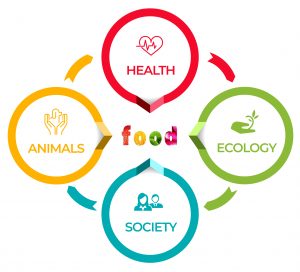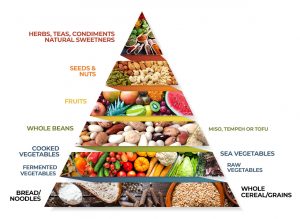Health

Health is a dominant factor in our life. Health can allow us to fully express our potential, enjoy the simple pleasures of life and make us more resilient to physical and emotional stress. Health is often described as a state of balance but balance with what? The word homeostasis is sometimes used meaning a state of dynamic balance between ourselves and our environment.
Our increased scientific knowledge and the traditional wisdom of many cultures shows us that the key to good health starts in the gut. Our intestinal tract contains the internal environment of the gut biome. It is here where the nutritional components of the external environment go through the processes of digestion and absorption. This is governed by the 100 trillion micro-organisms in the gut. It is in this internal environment where the most intimate contact between us and the outer world take place. We control this community of cells through our daily food.
A major function of the gut biome is immunity. In the biome, the immune system can “practice” and develop the resistance to pathogens that may enter the body. Vitamins B and K are created here. It is suspected that even more vitamins are synthesized in the biome that have not been discovered yet. In light of the increasing dangers for viral disease, the building of a healthy gut biome should be a priority for good health.

The Ecology Of Food
As with any creature, the human experience is all about finding food. It is the driving force of our biology. Along with air and water, food is essential for our very existence. It may seem simple-minded to say that, but it is a reality that we seem to forget.
Cultural food patterns often reflect a relationship to a social and physical environment which no longer exists. What we eat has to provide nourishment for excellent health, be sustainable, and provide adequate food for everyone. Food is a primary driver of disease, social injustice, environmental destruction, a loss of plant and animal diversity and the needless slaughter of billions of animals every year.

A Human Ecology Diet
The modern diet produces disease and death, not only for humans but non-humans as well. Our food choices are the main cause of death from degenerative disease, creates environmental chaos, the senseless slaughter of billions of sentient creatures and supports an economic system that makes regional self-sufficiency and food security impossible. Yet we march on. We fixate on fantasy stories about magical properties of the newest “super-food,” the power of reducing the sugar content in soft drinks or avoiding meat one day a week. None of these stop-gap measures are effective or timely.
Creating a healthy way of eating is not a science project. It is seldom the lack of a single nutrient that creates health issues. Poverty is the chief cause of malnutrition. In the West, excessive consumption of fat, animal protein, and simple sugars are the major causes of dietary-related dis- ease. The focus on single nutrients (such as, vitamin C, iron, roughage) generally simply causes unfounded fears and anxiety. Our focus should be on the whole profile of a healthy diet. This approach does not mean we neglect nutritional science; it simply means that science provides us with a useful checklist to assess our overall food choices.
The body is designed to produce health; it will try to accommodate the poor choices we make, laboring under the burden of poor judgment. Our addiction to poor nutrition guarantees a toxic condition, making us vulnerable to degenerative process and opportunistic infection. It also directly affects our sensitivity to our own physical condition and our state of mind.
If we look at the leading edge of nutritional science, we see that there is little disagreement. Certainly, there are conflicts with those who stubbornly defend the past, who have a vested interest in a particular product, or who refuse to believe that the foods they love can possibly be harmful; but these arguments are superficial and unimportant. If we apply the considerations in previous chapters regarding personal health, social justice, environmental concerns, and ethical considerations, we arrive at the Human Ecology Diet. It is a simple approach and contains all the foods essential for personal, social, and environmental well-being. The ingredients are not “superfoods” packed with powerful and mysterious micronutrients. In fact, a healthy diet is more a fusion of traditional diets from around the world with the simple considerations of ecological and economic realities taken into account.
There are many factors that are productive of health among them diet is the most important. Our diet is the direct link between human life and the natural environment. What we choose to eat is a direct reflection of how we value ourselves and the planet.
Health In Modern Times
The Human Ecology Project is informed by modern nutritional science, wisdom traditions and a respect for both human and non-human life. We agree with the World Health Organization definition of health.
“Health is a state of complete physical, mental and social well-being and not merely the absence of disease or infirmity.” – WHO Constitution
The focus of our work is on the creation of personal, social, and environmental health.
Nutritional Science
Over the past fifty years the field of nutrition has gone through massive changes. These changes have been a result of laboratory research on the dietary factors influenceing a variety of non-communitive diseases, the rise of focused epidemelogical studies on populations around the world and an increased volume of studies without sponsorship from the food industry.
The result of this work has provided exciting and important insight into the potential harm from many ingredients in the modern diet as well as the health benefits of eating a healthy diet.
Our Advisory Board includes a selection of men and women who represent this shift in our understanding of the health impact of the food we eat. Board members such as Professor T. Colin Campbell, Dr. John A. McDougall and Dr Nandita Shah embody this new direction in nutrition.
“A good diet is the most powerful weapon we have against disease and sickness.” – Professor T Colin Campbell
Wisdom Traditions
Increased interest in wisdom traditions from around the world influence our attitudes regarding health and our vision of creating a healthy way of eating. The understanding of foods, nutritional ecology, and the use of cooking to enhance dietary simplicity are inherent in many indigenous approaches to health
The work of Japanese philosopher and teacher George Ohsawa and his student Michio Kushi have been a great source of insight for us. Ohsawa deconstructed aspects of traditional Chinese medicine to create what he called Macrobiotics. Although the philosophy bears little relationship to Western nutritional science, the conclusions are remarkably similar.
Macrobiotics was an important influence in the rise of the natural and organic food movement in the 1960’s and 70’s and introduced many nutritionally useful foods and cooking concepts into the western diet as well as the idea of seasonal eating. The philosophy is ecological at its source and provides useful insights into the issue of diet and health.
“Peace begins in the kitchens and pantries, gardens, and backyards, where our food is grown and prepared.” – Michio Kushi
Sustainability
A healthy diet must fulfil our nutritional needs as well as being sustainable. Sustainability means supporting present needs as well as preserving and nourishing the environment for coming generations. This reflects a deep respect for all human and non-human life. Our daily actions can contribute to the creation of a healthy world. What we eat, as well as all the goods and services we buy or use effect the world around us.
The food we eat is one of the most intimate relationships we have with nature. Many health issues faced by the world today result from our breaking this bond. The natural world is the source of our wellbeing and the key to individual and social health.
“The more clearly, we can focus our attention on the wonders and realities of the universe about us, the less taste we shall have for destruction.”
-Rachel Carson
In good health


